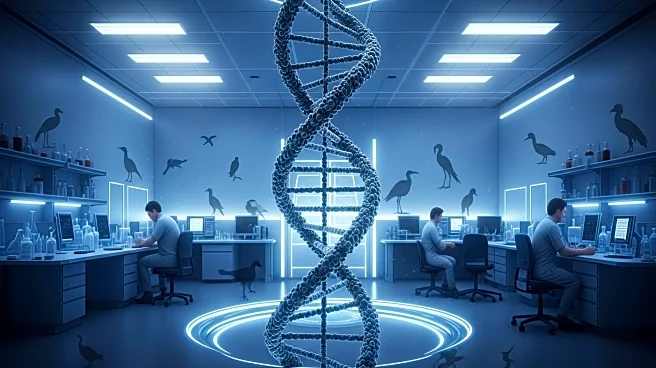What's Happening?
Colossal Biosciences, a biotech company based in Dallas, has announced a significant advancement in its efforts to resurrect the extinct dodo bird. The company has successfully grown primordial germ cells from the rock dove, a precursor to eggs and sperm, marking an early hurdle in the de-extinction process. The next step involves gene-editing these cells from the Nicobar pigeon, the dodo's closest living relative, to reconstruct a dodo-like genome. Colossal has established a breeding colony of Nicobar pigeons in Texas and is working on developing their primordial germ cells for editing. This breakthrough is part of Colossal's broader investment in de-extinction technology, which aims to drive discovery and develop tools for conservation efforts.
Why It's Important?
The efforts by Colossal Biosciences to resurrect the dodo bird represent a significant advancement in genetic engineering and conservation technology. This development could have profound implications for avian conservation, offering new possibilities for genetic rescue of endangered species. The ability to grow and gene-edit primordial germ cells opens up potential for biobanking capabilities, which could be crucial for preserving biodiversity. However, critics argue that true resurrection may not be possible without intact genomes, suggesting that the best outcome might be a genetically modified proxy or hybrid. The project also highlights ethical considerations in de-extinction efforts, as it raises questions about the impact on ecosystems and the role of humans in altering natural history.
What's Next?
Colossal Biosciences plans to inject gene-edited Nicobar germ cells into chicken embryos, allowing chickens to act as surrogates and potentially lay eggs that hatch into dodo-like birds. The company aims to rewild the resurrected dodo in Mauritius, where the birds were originally endemic. This follows Colossal's previous announcement to bring back the giant moa, another extinct bird species. The success of these projects could pave the way for further de-extinction efforts, including those for mammals like the woolly mammoth and Tasmanian tiger. The scientific community and conservationists will likely continue to debate the ethical and ecological implications of such endeavors.
Beyond the Headlines
The resurrection of extinct species like the dodo bird by Colossal Biosciences could trigger long-term shifts in conservation strategies and biodiversity management. It raises ethical questions about human intervention in natural processes and the potential consequences of reintroducing species into modern ecosystems. The project also highlights the intersection of technology and conservation, showcasing how genetic engineering can be leveraged for environmental purposes. As these technologies advance, they may redefine conservation priorities and challenge traditional views on species preservation.









